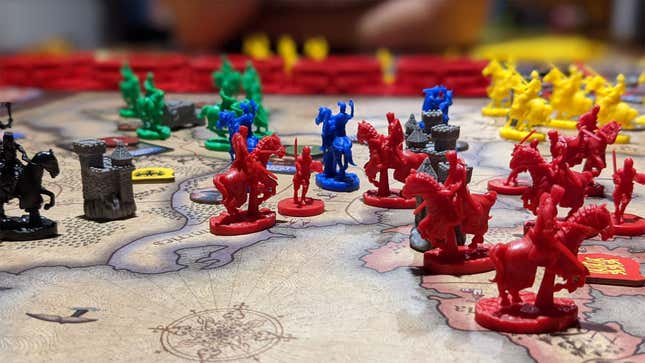
As we’re only now starting to see in video games, with The Last Of Us 2 being the most high profile casualty (so far), global Covid-19 lockdowns are wreaking absolute havoc on the ability of companies to make and sell games. But if you think it’s bad for video games, spare a thought for anyone involved in board games.
Because they’re made of cardboard and plastic and paper, and because almost all of those components are made in China, board game studios and publishers were already behind on their release schedules in 2020 thanks to the combination of China’s earlier covid-19 shutdowns and the lengthening effect that had on the country’s Lunar New Year’s break.
This post from Pandasaurus’ Nathan McNair, from back in January, seems almost quaint now with its listing of all the problems publishers were running into, and that was while people could still attend cons and only Chinese businesses were having their travel plans affected.
Now, though, it’s chaos. Many of the world’s biggest and most important board game shows have either been postponed or outright cancelled (the biggest, Gencon, has somehow not been, but that’s surely a matter of time). Board game stores around the world have been closed because they’re far from an essential service, and most importantly, publishers are now finding they’re unable to even get their games made, let alone ship them out internationally.
Where video games—particularly those on PC—at least have the fall-back of releasing digitally, a board game needs a box and pieces, and if they can’t be made or sold, then the whole industry comes to a standstill.
And so only a few weeks into the global reaction to covid-19 we’re already starting to see the effects it’s having on the board game industry. Asmodee, one of the biggest and most important publishers on the planet (and owner of brands like Fantasy Flight and Days of Wonder) have delayed all releases from the end of March through to May at the earliest. Which then pushes all the games due to release after that back in the schedule.
The Game Crafter, one of the biggest and most important producers of small-scale games on the planet, is shutting down for at least three weeks. In the video games x board games space, the Kickstarter for an adaptation of Rebellion’s Sniper series has been pushed back, because “we don’t want to ask you to support the project right now when there are bigger, more important things to worry about.”
And the problems don’t just extend to the logistics of board game sales! Board games are an inherently social pursuit, built around the idea that you’ll get friends over and sit huddled around a table for hours on end. That’s outright illegal in many places now, and so even if games were still being shipped, the market for them has shrunk dramatically, if only temporarily (with notable exceptions, of course).
Basically, the longer this goes on, the worse it’s going to get for every single part of the board games industry. Games won’t get made, manufactured games can’t be shipped or distributed properly, many of the stores selling them are closed and the people buying them are facing an unprecedented financial crisis and can’t play with friends even if they wanted to.
That’s a lot of doom and gloom, but there are some bright spots. If you’re not familiar with the scene, the board game industry is a lot friendlier than the death cult capitalism of video games, and so we’re seeing schemes like those implemented by publishers like Fireside, Burnt Island, Deep Water Games, Forbidden Games and Kids Table BG, who are selling discounted games straight out of their warehouse, then donating sizable chunks of those proceeds—between 20-50%—to bricks-and-mortar stores to help them get through this.
Another positive is that across China many workers returned to their offices and factories last month, which will at least get things moving again on the manufacturing side of things.
But until the rest of the supply and demand chain can return to something at least resembling normalcy, it’s going to be a rough few months for everyone in board games, from the people who make them right through to the people who play them.